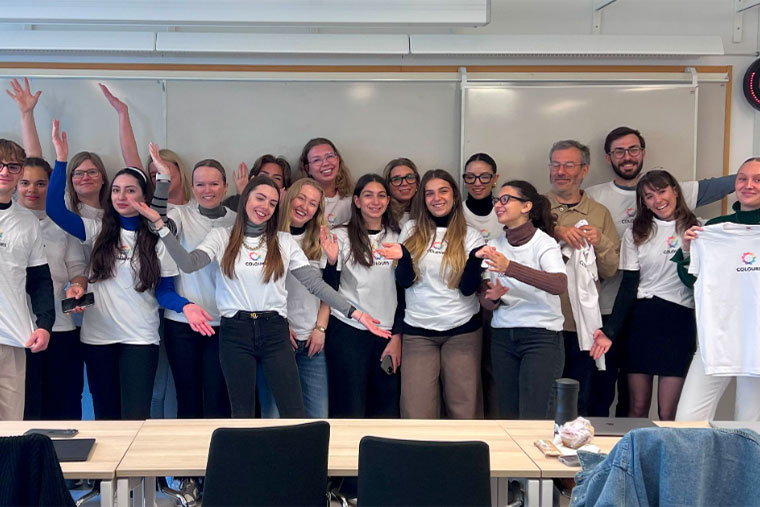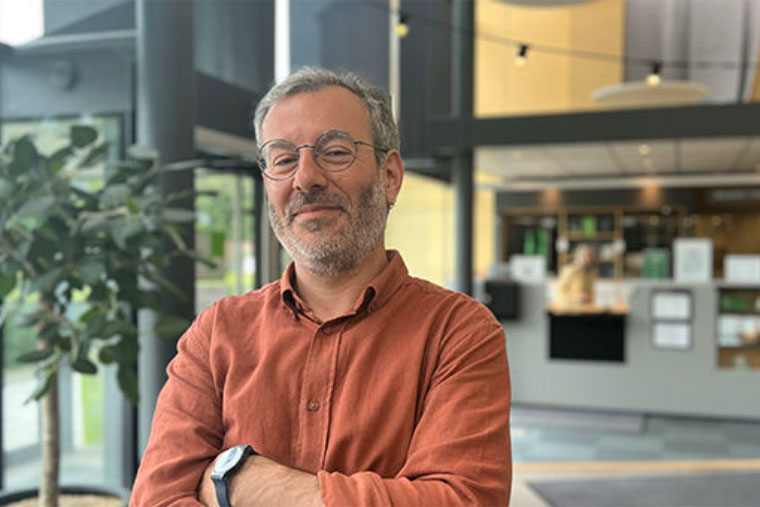The University’s First Summer Schools within COLOURS
It was a quick turnaround – but a successful one! Cross-Cultural Communication Competence and a course on Swedish labour law in the context of green and digital transitions became Kristianstad University’s first two summer schools, held in May and June. Both were organised within the framework of the COLOURS collaboration.
Joachim Liedtke, Associate Professor of Linguistics with a focus on the German language, normally teaches courses such as International Rhetoric and Intercultural Communication. He quickly agreed to develop the course Cross-Cultural Communication Competence. Summer schools may or may not offer academic credits – in this case, Joachim’s course did not.
The importance of interculturality
- Interculturality is extremely important! And it was so much fun! I have experience working with students from various countries, but I was still really nervous this time since there were no credits or grades. The students chose to come anyway, so I really felt I had to deliver, Joachim explains.
The course was short and intense, packed with exercises, experiments and case studies. The theory could be read at home, he felt.
One highlight was a field trip to the Disgusting Food Museum in Malmö, which tied in well with the theme, since food is such a key part of culture. At the end of the visit, students were invited to taste up to 25 different dishes – starting with roasted ants and getting progressively more challenging.
- I’ve taken students there before, but I’ve never seen anyone try all 25 dishes. This time, three of them did! You even have to sign a disclaimer acknowledging that you might get sick, feel ill for the rest of the day, and that you’re aware that you might be an idiot, haha!
Participants included former exchange students from Asia, Europe and North America – including both Ukrainian and Russian students. They were all very pleased, and Joachim hopes to run the course again.
Learning for life
Since there were no formal assessments, the focus shifted more towards intrinsic motivation.
- They understood that this was about learning for life. Many said they finally realised why understanding other cultures is so hard – and that they now know how to handle it differently. Some were students I had taught before. My goal is always to deliver something meaningful to them. That may have been the deciding factor for why they chose to come.
Joachim has worked at Kristianstad University since 1997 and is very happy here.
- It’s a great place to work, with kind colleagues. I really appreciate the level of personal responsibility and the flexibility to act based on what’s needed.
Originally from Bremen, Germany, Joachim has no plans to move back.
- Life is more intense when you live abroad – I really believe that!

New Course on Swedish Labour Law and the Green and Digital Transitions
Andrea Iossa, Senior Lecturer in Law specialising in labour law, led the course Labour Law Regulation and Industrial Relations at Company Level in the Context of the Green and Digital Transitions (3 ECTS). The course was fully booked and attracted students from Kristianstad University’s Human Resources programme as well as from the University of Ferrara in Italy – one of the partner institutions in the COLOURS alliance.
Some students came from Ferrara’s law programme, others from HR programmes focused on labour market regulation. Silvia Borelli, Professor of Labour Law at Ferrara and the initiator of the collaboration, participated together with two doctoral students.
- I’ve previously taught international students in introductory courses on Swedish law in Lund, but I’ve never developed a course like this before, says Andrea. There was a lot to learn – from writing the syllabus to organising panel discussions and a field study visit to Skånemejerier.
During the visit to Skånemejerier, students met the Head of Production, the HR Manager, and a union representative from the Food Workers’ Union. They had the opportunity to ask questions on topics ranging from green transitions and digitalisation to wage formation, co-determination and negotiations.
Comparative perspectives
- Initially, the course focused more on Swedish labour law, but the students asked for more comparisons with Italy. We incorporated that through group work. They got to know each other by working in mixed teams, and nearly all produced some form of comparative analysis.
A panel discussion also featured local representatives from the LO trade union and the Food Workers’ Union in Kristianstad, creating an engaging dialogue for the students with strong local relevance.
- I’m actually very pleased, says Andrea – and so were the students!
course was developed over the course of about a year – a tight timeframe for creating a new course, especially within the COLOURS framework. Andrea emphasises the valuable support he received from Helena Axelsson (Programme Director for HR), the department head, and the university’s COLOURS team.
Support when there’s an idea
- There is support available – as long as you have a clear idea! Everything was new, and we all learned a lot.
Kristianstad students took good care of the visitors, and the programme included several social activities such as a welcome dinner and a film screening. The film – Segertåg – is a documentary about a conflict between train staff and a rail company, and it sparked rich discussions about labour law and union activity in Sweden.
Proposal number: 101124491
Funded by the European Union. Views and opinions expressed are however those of the author(s) only and do not necessarily reflect those of the European Union or the European Education and Culture Executive Agency (EACEA). Neither the European Union nor EACEA can be held responsible for them.
